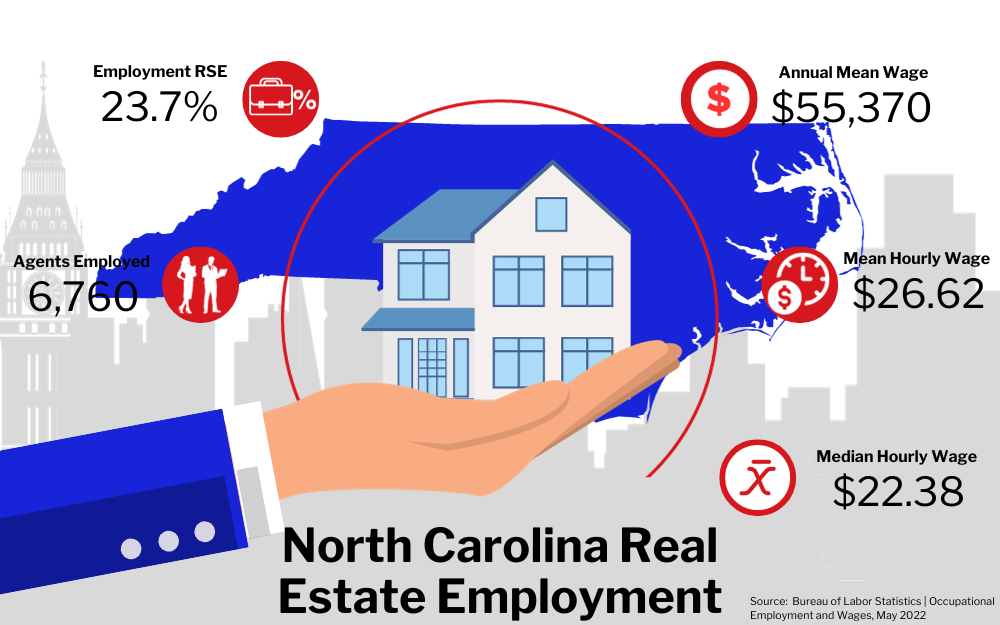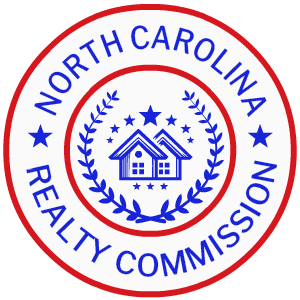
According to the North Carolina Real Estate Commission (NCREC),1 NC has 17,772 brokers-in-charge, 6,467 active provisional brokers, and 82,970 brokers in 2023. But, the wonderful thing about becoming a real estate agent in the state is that it provides an excellent opportunity to grow your professional skills.
Working as a real estate broker is a great career choice. You can make it a part-time or full-time job with a versatile, flexible schedule, and you don’t need an advanced degree to be a broker in North Carolina.
Best of all is the freedom and control over your income by determining how many clients you work with and which projects you accept.
This comprehensive guide outlines the steps required to become a real estate broker in North Carolina, including how to pass the licensing exam, the topics that are covered, and the regulations and contacts you’ll need to get started.
Getting Your Real Estate Broker License in North Carolina
North Carolina only issues broker’s licenses. Brokers work with clients to help them buy or sell their perfect properties, negotiating on behalf of the clients and making offers.
The responsibilities of a broker don’t change, but brokers can work independently and make a bit more money from the transaction. But, there are graduating levels of the type of broker you can become in the state.
Provisional brokers are entry-level individuals who team with a broker-in-charge after passing the state licensing exam and enroll in a post-licensing education program for 90 hours up to 18 months after becoming a provisional broker.
The required steps to obtaining your real estate brokerage license begin with:
- Meet the licensing criteria
- Take a state-approved pre-licensing course for 75 hours
- Send in your application
- Pass the North Carolina Real Estate Broker License Exam
- Select a sponsoring broker
Basic Criteria To Qualify for Real Estate Professional License
First, you must qualify to become a real estate agent or broker under NCREC.2
The agency has these requirements:
- Have a “requisite character” to receive a license
- Be a United States citizen or legally allowed to work in the country
- Receive pre-licensing education
- Send in a license application
- Pay the application fee
- Earn a passing grade on the NC real estate license exam
The character qualification is designed to ensure that real estate professionals in the state are trustworthy. This generally involves a fingerprint background check to search for criminal history records.
The NCREC will not necessarily take away your dreams of becoming a real estate agent or broker if you have legal issues on your record. However, you should include paperwork detailing unpaid judgments, liens, licensure disciplinary actions, and criminal offenses, even major traffic offenses.
Age and Fundamental Academic Criteria
You can’t apply for a real estate broker or agent license in North Carolina unless you’re at least 18, but no higher education (i.e., college degree) is required. You can go right from high school to working as a real estate agent (after you pass your licensing exams, of course) or explore other careers before settling on this one.
Obligatory Course Hours for Real Estate Licensing
What education is required to be a real estate agent? Typically most states begin with the requirement of having a high school diploma or equivalent.
Applicants should also enroll in the North Carolina Broker Prelicensing Course, which thanks to modern upgrades, is now offered online.
You can plan the 75 hours of required coursework around your time and schedule. That’s handy if you already have a full-time job but are eager to switch careers.
The pre-licensing course will provide all the information needed to pass the NC real estate licensing exam.
Before you finish your pre-licensing education, you must take a test and pass. This test can only be administered by an Education Provider certified by NCREC.
Expenditure on Pre-Licensing Education for Real Estate
How much will you spend on your real estate pre-licensing education in North Carolina? The cost varies depending on the school you enroll in, costing anywhere from $100 to $300.
Essential Background Investigation for Real Estate Professionals (Fingerprint Facility Details)
Aspiring real estate professionals in NC must get fingerprinted for a background examination.
Here are the facilities that offer this service throughout the state:
| Fingerprinting Facility in NC | Address |
| Wake County City-County Bureau of Investigation (CCBI)3 | 3301 Hammond Road Raleigh, NC 27603 |
| Orange County Sheriff’s Office | 106 East Margaret Lane Hillsborough, NC 27278 |
| Mecklenburg County Sheriff’s Office | 700 East 4th Street, Charlotte, NC 28202 |
| Johnston County Sheriff’s Office | 120 South 3rd Street Smithfield, NC 27577 |
| Harnett County Sheriff’s Office | 175 Bain Street Lillington, NC 27546 |
| Franklin County Sheriff’s Office | 285 T Kemp Road Louisburg, NC 27549 |
| Durham County Sheriff’s Office | 510 South Dillard Street Durham, NC 27701 |
| Cumberland County Sheriff’s Office | 131 Dick Street Fayetteville, NC 28301 |
| Wake Forest PD | 225 South Taylor Street Wake Forest, NC 27587 |
You might have to pay a fee for fingerprinting. For example, the Wake County CCBI charges $30 and $5 for additional fingerprinting cards.
References
1North Carolina Real Estate Commission. (2023, November 7). Blog. NCREC Blog. Retrieved November 15, 2023, from <https://ncrecblog.com/>
2North Carolina Real Estate Commission. (2023, March). Real Estate Licensing in North Carolina. North Carolina Real Estate Commission. Retrieved November 15, 2023, from <https://www.ncrec.gov/Brochures/general.pdf>
3Wake County Government. (2023). Fingerprinting and Public Services. Wake County Government. Retrieved November 15, 2023, from <https://www.wake.gov/departments-government/city-county-bureau-identification-ccbi/fingerprinting-and-public-services>
